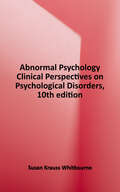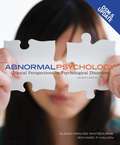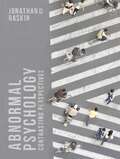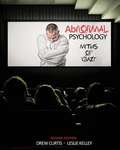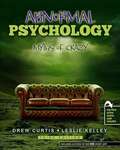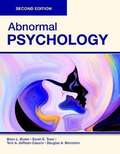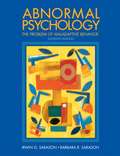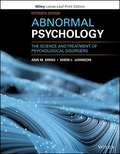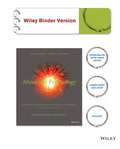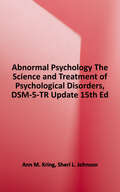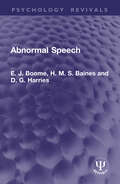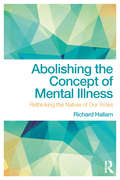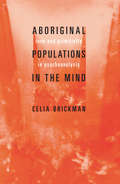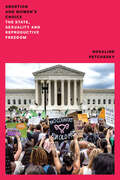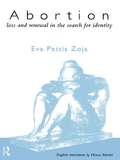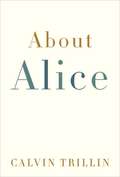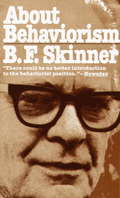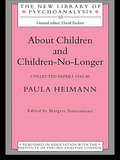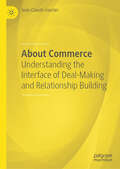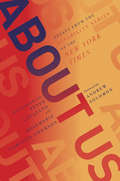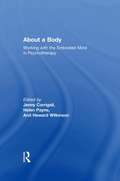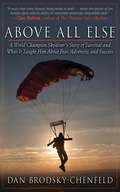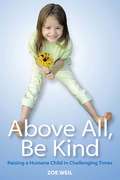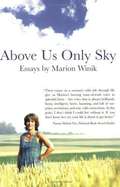- Table View
- List View
Abnormal Psychology: Clinical Perspectives on Psychological Disorders
by Susan Krauss WhitbournePresenting the human side of Psychological Disorders. Susan Krauss Whitbourne's Abnormal Psychology: Clinical Perspectives on Psychological Disorders, shows students real-life portrayals of psychological disorders through an extensive use of clinical and online case studies, biographies, and first-person quotations.
Abnormal Psychology: Clinical Perspectives on Psychological Disorders with DSM-5 Update
by Susan Krauss Whitbourne Richard HalginIn Susan Krauss Whitbourne and Richard Halgin's "Abnormal Psychology: Clinical Perspectives on Psychological Disorders," students are shown the human side of Abnormal Psychology. Through the widespread use of current and relevant clinical case studies, and the biographies and first-person quotations in the Real Stories feature, students are presented with real-life portrayals of the disorders featured in the text. The text maintains the integrative approach to treatment using the biopsychosocial model, and acknowledges the evolution of psychological disorders over the lifespan.
Abnormal Psychology: Contrasting Perspectives
by Jonathan D. RaskinThis groundbreaking core textbook offers a comprehensive overview of different approaches to the assessment and treatment of psychological disorders. The book retains important diagnostic perspectives, including the DSM-5, ICD-10, ICD-11 and PDM, but also widens the scope of coverage beyond mainstream psychiatric models to include psychological, biological, historical, sociocultural and therapeutic approaches. Contemporary and well-balanced, this book provides an even-handed and holistic foundation, allowing students to develop a strong critical mindset while retaining a robust research-driven orientation. This book is ideal for undergraduate and postgraduates students on abnormal psychology, psychopathology, mental health or clinical psychology modules.
Abnormal Psychology: Myths of 'Crazy' (Second Edition)
by Drew Curtis Leslie KelleyAbnormal Psychology: Myths of ‘Crazy’ guides readers in the deconstruction of these myths by means of a process designed to help formulate a sound approach to abnormality and a thorough understanding of various disorders through the lens of the DSM-5. Students will learn the importance of intentionally directing attention toward the humanity of the individuals who have various disorders, in order to develop more accurate perceptions of these individuals. The goal is to reflect on the humanity within abnormality rather than reducing people to a label and stripping them of their humanity. Readers will be confronted with the idea that abnormality is not exemplified by “crazies” in a straight-jacket, void of coherent words, but rather by human persons, who are often suffering, feeling immense pain, or who have impaired functioning in their life, which may even include being void of coherent words.
Abnormal Psychology: Myths of Crazy
by Drew Curtis Leslie KelleyAbnormal Psychology: Myths of ‘Crazy’ challenges students to reconsider the ideas they have concerning myths of “crazy” and how these ideas developed. <p><p>Abnormal Psychology: Myths of ‘Crazy’ guides readers in the deconstruction of these myths by means of a process designed to help formulate a sound approach to abnormality and a thorough understanding of various disorders through the lens of the DSM-5. Students will learn the importance of intentionally directing attention toward the humanity of the individuals who have various disorders, in order to develop more accurate perceptions of these individuals. The goal is to reflect on the humanity within abnormality rather than reducing people to a label and stripping them of their humanity. Readers will be confronted with the idea that abnormality is not exemplified by “crazies” in a straight-jacket, void of coherent words, but rather by human persons, who are often suffering, feeling immense pain, or who have impaired functioning in their life, which may even include being void of coherent words. <p><p>If you’re ready to challenge your assumptions and expand your understanding of psychopathology, then crack this “crazy” book open and get to reading!
Abnormal Psychology: Paperback-4c
by Brian Burke Douglas Bernstein Sarah Trost Terri DeRoon-CassiniAbnormal Psychology, Second Edition (paperback-4c)
Abnormal Psychology: The Problem of Maladaptive Behavior (11th edition)
by Irwin G. Sarason Barbara R. SarasonThis classic textbook builds on the strengths of existing theoretical systems and clinical methods to provide students with a comprehensive and up-to-date real-world overview of the field of abnormal psychology. It focuses on maladaptive behavior as a product of the interaction between personal vulnerabilities and resiliencies.
Abnormal Psychology: The Science and Treatment of Psychological Disorders
by Ann M. Kring Sheri L. JohnsonSince its inception, this book has carefully balanced research and clinical application, engaging learners in the complex challenges with which clinicians and scientists are faced every day. The new 15th edition features a new integrated approach, shining a light on psychopathologies' root causes and most effective treatments by approaching these disorders from multiple, complementary perspectives underscoring that very often biological, cognitive, behavioral, and socioemotional factors are critical to understanding psychological disorders.
Abnormal Psychology: The Science and Treatment of Psychological Disorders (Thirteenth Edition)
by Ann M. Kring John M. Neale Gerald C. Davison Sheri L. JohnsonFor nearly four decades, Abnormal Psychology, Binder Ready Version 13th Edition has been a trusted resource for instructors and students. Known for its comprehensive coverage of current research, theory and treatment, Kring's Abnormal Psychology, Binder Ready Version 13th Edition has long been praised for its multiple paradigm approach and coverage of cutting-edge research and theory which are central to the discipline.
Abnormal Psychology: The Science and Treatment of Psychological Disorders, DSM-5-TR Update
by Ann M. Kring Sheri L. JohnsonThoroughly updated to reflect the publication of the DSM-5-TR in March 2022, Abnormal Psychology, 15th Edition, carefully balances research and clinical application while engaging learners in the complex challenges faced by clinicians and scientists every day. With each new edition, the authors update and optimize the book to enhance its scholarly and pedagogical features and provide a critical understanding of key concepts in a style that is accessible, stimulating, and inclusive of clinical and theoretical concerns. <p><p>The fifteenth edition features a new integrated approach that shines a light on the root causes and most effective treatments of psychopathologies from multiple, complementary perspectives. Introductory chapters give students all the background they need to understand the theories, methods, and principles used in later chapters. The importance of stigma and mental illness is discussed throughout Abnormal Psychology and never is this more important than now when many social ills are too easily blamed on mental illness.
Abnormal Speech (Psychology Revivals)
by E. J. Boome H. M. Baines D. G. HarriesOriginally published in 1939, it was only recently that serious study and attention had been given to disorders of speech and there was a growing demand for books dealing with the subject. Abnormal Speech deals concisely with the aetiology of the varied abnormalities of speech and discusses the treatment practised by experienced therapists at the time, successful in affecting permanent cures. It was now recognised that the causes and classification of speech disorders were fairly numerous, and that the essence of treatment consisted of discovering the nature and cause to apply the appropriate method of treatment. It was revised in 1950 in some part to account for the effects of the second world war on speech disorders.Today it can be read in its historical context.This book is a re-issue originally published in 1939. The language used and views portrayed are a reflection of its era and no offence is meant by the Publishers to any reader by this re-publication.
Abolishing the Concept of Mental Illness: Rethinking the Nature of Our Woes
by Richard HallamIn Abolishing the Concept of Mental Illness: Rethinking the Nature of Our Woes, Richard Hallam takes aim at the very concept of mental illness, and explores new ways of thinking about and responding to psychological distress. Though the concept of mental illness has infiltrated everyday language, academic research, and public policy-making, there is very little evidence that woes are caused by somatic dysfunction. This timely book rebuts arguments put forward to defend the illness myth and traces historical sources of the mind/body debate. The author presents a balanced overview of the past utility and current disadvantages of employing a medical illness metaphor against the backdrop of current UK clinical practice. Insightful and easy to read, Abolishing the Concept of Mental Illness will appeal to all professionals and academics working in clinical psychology, as well as psychotherapists and other mental health practitioners.
Aboriginal Populations in the Mind: Race and Primitivity in Psychoanalysis
by Celia BrickmanIn this subtle and commanding analysis, Celia Brickman explores how the colonialist racial discourse of late-nineteenth-century anthropology found its way into Freud´s work, where it came to play a covert but crucial role in his notions of subjectivity.
Abortion and Woman's Choice: The State, Sexuality and Reproductive Freedom
by Rosalind Pollack Petchesky&“The best book I have read on the politics of reproduction. It raises complex theoretical and strategic questions, in a clear and accessible way, and represents an important breakthrough in feminist thinking.&”– Leslie Doyal, author of What Makes Women SickThis prize-winning study is the definitive work on the politics of abortion and fertility. Rosalind Pollack Petchesky provides overwhelming evidence against the anti-abortion forces and in the process takes up issues of teenage sexuality, the politics of eugenics, and women&’s relationship to medical technology. The book&’s continuing relevance is a tribute to the author and a sad indictment of contemporary politics.
Abortion: Loss and Renewal in the Search for Identity
by Eva Pattis ZojaThe debate on abortion has tended to avoid the psychological significance of an unwanted pregnancy, dominated istead by the strong emotions the subject excites. Eva Pattis Zoja examines the thoughts that surround a woman's decision to end a pregnancy, and presents the challenging thesis that voluntary abortion can often be a violent and unconscious act of self-realisation. Treating a theme which is central to our existence, the author makes no attempt to argue for or against, or to deny the painful nature of the subject which she tackles, but instead looks at the way in which a decision to abort can affect a woman's inner life.
About Alice
by Calvin TrillinIn Calvin Trillin's antic tales of family life, she was portrayed as the wife who had "a weird predilection for limiting our family to three meals a day" and the mother who thought that if you didn't go to every performance of your child's school play, "the county would come and take the child." Now, five years after her death, her husband offers this loving portrait of Alice Trillin off the page-his loving portrait of Alice Trillin off the page-an educator who was equally at home teaching at a university or a drug treatment center, a gifted writer, a stunningly beautiful and thoroughly engaged woman who, in the words of a friend, "managed to navigate the tricky waters between living a life you could be proud of and still delighting in the many things there are to take pleasure in."Though it deals with devastating loss, About Alice is also a love story, chronicling a romance that began at a Manhattan party when Calvin Trillin desperately tried to impress a young woman who "seemed to glow.""You have never again been as funny as you were that night," Alice would say, twenty or thirty years later."You mean I peaked in December of 1963?""I'm afraid so."But he never quit trying to impress her. In his writing, she was sometimes his subject and always his muse. The dedication of the first book he published after her death read, "I wrote this for Alice. Actually, I wrote everything for Alice."In that spirit, Calvin Trillin has, with About Alice, created a gift to the wife he adored and to his readers.From the Hardcover edition.
About Behaviorism
by B. F. SkinnerThe basic book about the controversial philosophy known as behaviorism, written by its leading exponent. Bibliography, index.From the Paperback edition.
About Children and Children-No-Longer: Collected Papers 1942-80 (The New Library of Psychoanalysis #Vol. 10)
by Paula HeimannAbout Children and Children-no-longer is the long awaited collection of Paula Heimann's published and unpublished papers. From the published work it includes the seminal paper 'On Countertransference' (1950); 'Dynamics and Transference Interpretations' (1956); 'Some Notes on Sublimation' (1959); and 'Notes on the Anal Stage' (1962). In addition, more recent works are published here in English for the first time, describing the author's particular integration of theory and technique. Paula Heimann's ideas on an undifferentiated early phase of infant development and its implications for analytic technique, along with her unique knowledge of both Kleinian object relations and classical theory and technique, make her work very relevant both to present-day practice and the understanding of the historical development of some central psychoanalytic ideas.
About Commerce: Understanding the Interface of Deal-Making and Relationship Building
by Jean-Claude UsunierThe word &‘commerce&’ is infrequently used in contemporary business speak and, when it is, it is typically as a somewhat archaic synonym for business or trade, or otherwise in the context of &‘e-commerce&’. This book defines commerce by its traditional meaning, as the activity of transaction and exchange, and explores the corresponding interaction of human behaviour and economic interests. This book develops not only an understanding of the ambiguous interface between deals and relationships, but also the skills to manage it according to the situations and contexts in which it arises. The aim is to use advances on the fundamental phenomena of economic exchange (trust, reciprocity, altruism, reputation, etc.) and to apply them to a detailed explanation of the ins and outs of commerce. Of great interest to scholars and students of marketing, organisational behaviour and economics, this book attempts to bring together these advances to focus on the commercial phenomenon and propose a synthetic approach to the exchange relationship.
About Dependence and Separation (Good Answers to Tough Questions)
by Joy BerryThis book can answer the following questions: * How do you become dependent on other people, things and places? * Does your dependency change as you become older? * How does it feel to be separated from the people, things, and places you depend on? * What facts about separation do you need to know? * How can you handle separation appropriately?
About Us: Essays From The New York Times' Disability Series
by Rosemarie Garland-Thomson Peter CatapanoBased on the pioneering New York Times series, About Us collects the personal essays and reflections that have transformed the national conversation around disability. <P><P> Boldly claiming a space in which people with disabilities can be seen and heard as they are—not as others perceive them—About Us captures the voices of a community that has for too long been stereotyped and misrepresented. Speaking not only to those with disabilities, but also to their families, coworkers and support networks, the authors in About Us offer intimate stories of how they navigate a world not built for them. Since its 2016 debut, the popular New York Times’ “Disability” column has transformed the national dialogue around disability. Now, echoing the refrain of the disability rights movement, “Nothing about us without us,” this landmark collection gathers the most powerful essays from the series that speak to the fullness of human experience—stories about first romance, childhood shame and isolation, segregation, professional ambition, child-bearing and parenting, aging and beyond. <P><P>Reflecting on the fraught conversations around disability—from the friend who says “I don’t think of you as disabled,” to the father who scolds his child with attention differences, “Stop it stop it stop it what is wrong with you?”—the stories here reveal the range of responses, and the variety of consequences, to being labeled as “disabled” by the broader public. <P><P>Here, a writer recounts her path through medical school as a wheelchair user—forging a unique bridge between patients with disabilities and their physicians. An acclaimed artist with spina bifida discusses her art practice as one that invites us to “stretch ourselves toward a world where all bodies are exquisite.” With these notes of triumph, these stories also offer honest portrayals of frustration over access to medical care, the burden of social stigma and the nearly constant need to self-advocate in the public realm. <P><P>In its final sections, About Us turns to the questions of love, family and joy to show how it is possible to revel in life as a person with disabilities. Subverting the pervasive belief that disability results in relentless suffering and isolation, a quadriplegic writer reveals how she rediscovered intimacy without touch, and a mother with a chronic illness shares what her condition has taught her young children. With a foreword by Andrew Solomon and introductory comments by co-editors Peter Catapano and Rosemarie Garland-Thomson, About Us is a landmark publication of the disability movement for readers of all backgrounds, forms and abilities. <P><P>Topics Include: Becoming Disabled • Mental Illness is not a Horror Show • Disability and the Right to Choose • Brain Injury and the Civil Right We Don’t Think • The Deaf Body in Public Space • The Everyday Anxiety of the Stutterer • I Use a Wheelchair. And Yes, I’m Your Doctor • A Symbol for “Nobody” That’s Really for Everybody • Flying While Blind • My $1,000 Anxiety Attack • A Girlfriend of My Own • The Three-Legged Dog Who Carried Me • Passing My Disability On to My Children • I Have Diabetes. Am I to Blame? • Learning to Sing Again • A Disabled Life is a Life Worth Living
About a Body: Working with the Embodied Mind in Psychotherapy
by Jenny Corrigall, Helen Payne and Heward WilkinsonHow does our body reveal us to ourselves? The body can inform the work we do in mental health. This unique collection invites the reader to consider the way we think about the embodied mind, and how it can inform both our lives and our work in psychotherapy and counselling. The body is viewed as integral to the mind in this book, and in the approaches illustrated in it. Instead of splitting off the body and treating the patient as a body with a mind, contributors from a variety of approaches ask the reader to consider how we might be with, and work with, ‘bodymind’ as an interrelated whole. Subjects covered include: the application of affective neuroscience understandings to life as well as to clinical issues the body in psychotherapy with a person who is facing death the history, significance and scope of body psychotherapy today psychoanalytic approaches to working with the embodied mind authentic movement groups in the development of wellbeing in our bodymindspirit the body and spirituality This book is unique in its pluralism: it includes a wide range of differing views of the importance of the body in psychotherapy, both in theory and in practice, and it relates these to the latest discussions in affective neuroscience. It will be invaluable for those working in, or studying, psychotherapy and counselling, and will also interest those working generally in the mental health field.
Above All Else: A World Champion Skydiver's Story of Survival and What It Taught Him About Fear, Adversity, and Success
by Dan Brodsky-ChenfeldWorld famous competitive skydiver and coach Dan Brodsky-Chenfeld presents proven tools and techniques for success and explains how they can be used in everyday life. Dan survived a plane crash from which sixteen of the twenty-two people on board were killed. He was left critically injured and woke up from a six-week-long coma with a broken neck, broken skull, severe head trauma, a collapsed lung, and other serious internal injuries. Against all odds, Dan recovered and went on to become one of the greatest competitive skydiver in the world. With the love and support of friends and family, Dan was able not only to resurrect his life but return to skydiving to achieve greater heights than he could have ever imagined. His techniques and methods for excelling are applicable to all people, no matter their goals. Dan uses his experiences to teach the lessons heOCOs learnedOCoas a competitor, coach, business owner, father, and husbandOCoto help others achieve their dreams, overcome obstacles, and reach their peak performance.
Above All, Be Kind: Raising a Humane Child in Challenging Times
by Zoe WeilA pioneer in the humane education movement shares an essential guide for new parents who want to raise their children with genuine compassion.In Above All, Be Kind, Zoe Weil teaches parents how to raise their children to be humane in the broadest sense. This includes being more compassionate in their interactions with family and friends, also means growing up to make life choices that demonstrate respect for the environment, other species, and all people. The book includes chapters for early, middle, teenage, and young adult years, as well as activities, issue sidebars, cases, tips, and profiles.
Above Us Only Sky
by Marion WinikFrom the book: There are writers who make you laugh yourself silly, writers who make you weep, writers who make you think more deeply about your life and your world. As NPR listeners and Marion Winik fans know, this sparkling, high-energy essayist does all three. Whether she is regaling us with stories about parenting her brood of children and stepchildren ages four to seventeen, recounting poignant stories of her childhood-or juicier ones from her adulthood-Winik's newest offering is a treat for dedicated fans and new readers alike.
